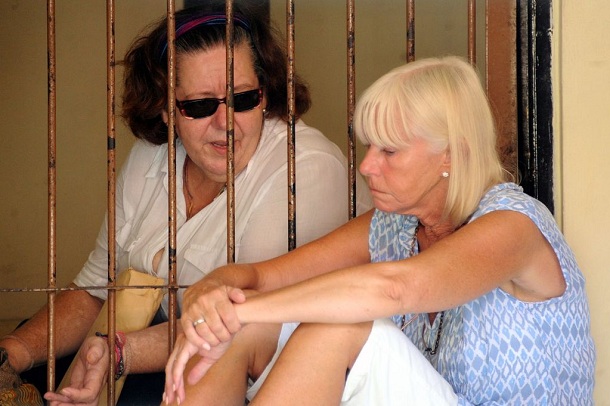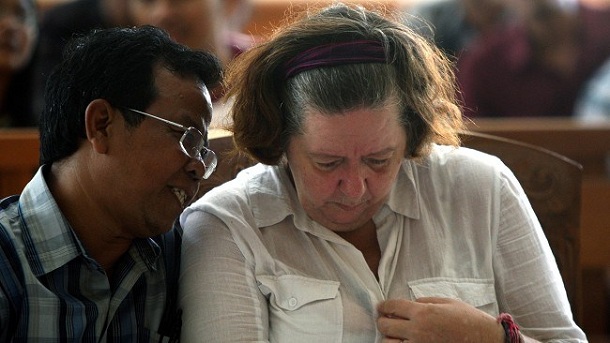British woman Lindsay Sandiford has been sentenced to death for drug smuggling on the Indonesian island of Bali.
The 56-year-old grandmother, originally from Redcar, Teesside, had been found guilty of violating the country’s strict drug laws.
Sandiford was arrested in May 2012 at Bali airport when customs officers found 3.8kg of cocaine worth £1.6m in her luggage. She claimed she had been forced to smuggle the drugs into Bali from Thailand by a criminal gang.
Prosecutors announced in December that they would be recommending a 15-year prison sentence, after she agreed to co-operate in a sting operation in which police swooped on four other suspects alleged to be her accomplices, including Britons Rachel Dougall, Julian Pounder and Paul Beales.
Pounder is accused of receiving the drugs in Bali, where cocaine and ecstasy are often bought and sold between foreign nationals. A verdict is expected in his trial on Wednesday.
Delivering Sandiford’s verdict, a judge panel headed by Mr Amser Simanjuntak said that Sandiford had damaged the image of Bali as a tourism destination and weakened the government’s programme of drug annihilation.
“We find Lindsay Sandiford convincingly and legally guilty of importing narcotics. We found no reason to lighten her sentence,” said Simanjuntak.
In her witness statement, Sandiford said: “I would like to begin by apologising to the Republic of Indonesia and the Indonesian people for my involvement.
“I would never have become involved in something like this but the lives of my children were in danger and I felt I had to protect them.”
Local journalist Amelia Rose was in court when the Sandiford was sentenced.
“She was in shock, but she managed to hold her composure and stand up while the judge read out her sentence,” she said.
“Her eyes turned red from tears for a second but she managed to hold her composure again.
“There is still a long way to go before an execution can take place. She can appeal to the High Court then the Supreme Court in Jakarta. If she can present new evidence she can have a judicial review.
“Then there is also the chance of clemency with the President.”
Sandiford’s defence lawyer, Esra Karo-Karo, said: “She was very shocked. This is unpredicted, she never thought of receiving death penalty.
“The judge did not even consider our reason to leniency as we proposed in our defence. We will appeal.”
A spokeswoman for the Foreign and Commonwealth Office said: “We can confirm that a British national is facing the death penalty in Indonesia.
“We remain in close contact with that national and continue to provide consular assistance and the UK remains strongly opposed to the death penalty in all circumstances.
“We will intervene at whatever stage and level is judged appropriate and will use high-level political lobbying when necessary”.
Dougall, whose young daughter is reportedly being cared for by their maid and gardener on the island, has claimed she was the victim of a “fit-up”.
Reprieve, a charity which seeks to enforce human rights for prisoners, said Sandiford was targeted by drug traffickers.
Spokeswoman Harriet McCulloch said: “Lindsay was targeted by drug traffickers who exploited her vulnerability and made threats against her children.
“Following her arrest, she was interrogated by the Indonesian police without a translator, legal representation or the assistance of the British Embassy for 10 days.
A statement by Dr Jennifer Fleetwood, an expert on the coercion of women in the international drug trade, was also read out, which suggested that Sandiford’s “vulnerability” would have made her an ideal target for drugs traffickers.
“There is evidence to suggest that a trafficker would seek someone who was vulnerable. Having reviewed extracts from Lindsay’s medical records I know that Lindsay has a history of mental health issues.
“This may have unfortunately made her an attractive target for threats, manipulation and coercion by one or more parties over a period of time, which led to her being stopped at Ngurah Rai International Airport”.
At the end of 2011 there were 13 British nationals sentenced to death and awaiting execution, and approximately 40 British prisoners facing charges that may attract the death penalty.
Indonesia has 114 prisoners on death row, according to a March 2012 study by Australia’s Lowy Institute for International Policy. Five foreigners have been executed since 1998, all for drug crimes, according to the institute.
President Susilo Bambang Yudhoyono has granted clemency to four drug offenders on death row since he took office in 2004.
[adrotate banner=”41″]

 Landslide in Cameroon Following Heavy Rains: Dozens Trapped Under Debris
Landslide in Cameroon Following Heavy Rains: Dozens Trapped Under Debris Valencia Requests €31 Billion in Aid Following Devastating Floods
Valencia Requests €31 Billion in Aid Following Devastating Floods Pro-Western president wins in Moldova – EU relieved
Pro-Western president wins in Moldova – EU relieved In the Italian Alps: Four mountain climbers die in accidents
In the Italian Alps: Four mountain climbers die in accidents